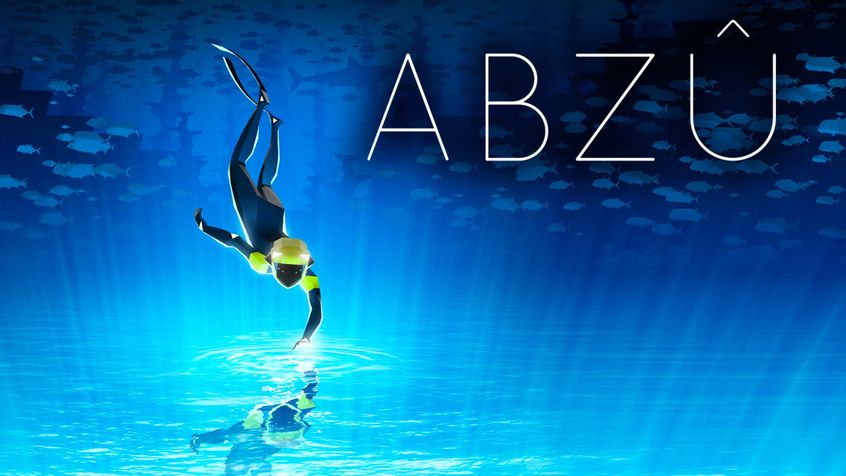Abzu
A common question that comes up when discussing walking simulators is the question of the nature of games themselves. What exactly is a game? Is there some minimum standard of interactivity a piece of software has to fulfil to be considered a game? Are walking simulators, which by their very nature have minimal actual gameplay, games in the traditional sense? I’ve made the argument before that walking simulators meet the barest definition of “game,” and I’m prepared to make the same argument again here. However, having that argument feels like it misses a crucial element of what Abzu actually is and what it aspires to be.
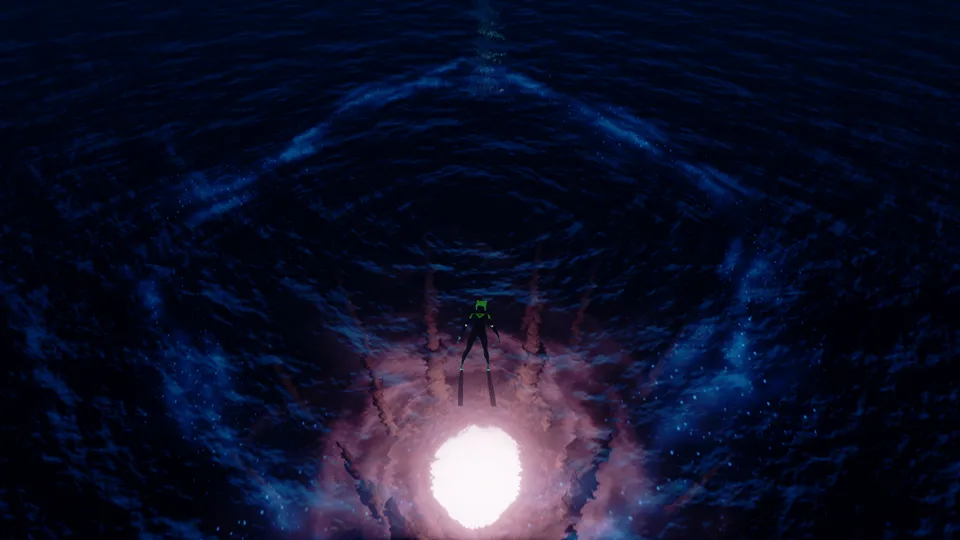 Stare too long into the abyss, and you get sucked into a deepsea video game, or something like that
Stare too long into the abyss, and you get sucked into a deepsea video game, or something like that
In Abzu, you play as a diver exploring a series of underwater caves and ruins, restoring life to the world around you, and hanging out with a wide range of fishy friends. “Play” is stretching the definition here, however. Abzu is less about being able to perfect a particular gameplay loop, and instead tells the story of this diver exploring the caves and bringing life to them. There are very small puzzles and a few collectibles, but the game itself is the journey. You start in one cave and simply follow the path before you, until you arrive at the end. There are no choices, and there are no real ways to go wrong. All that’s asked is that you go on this journey.
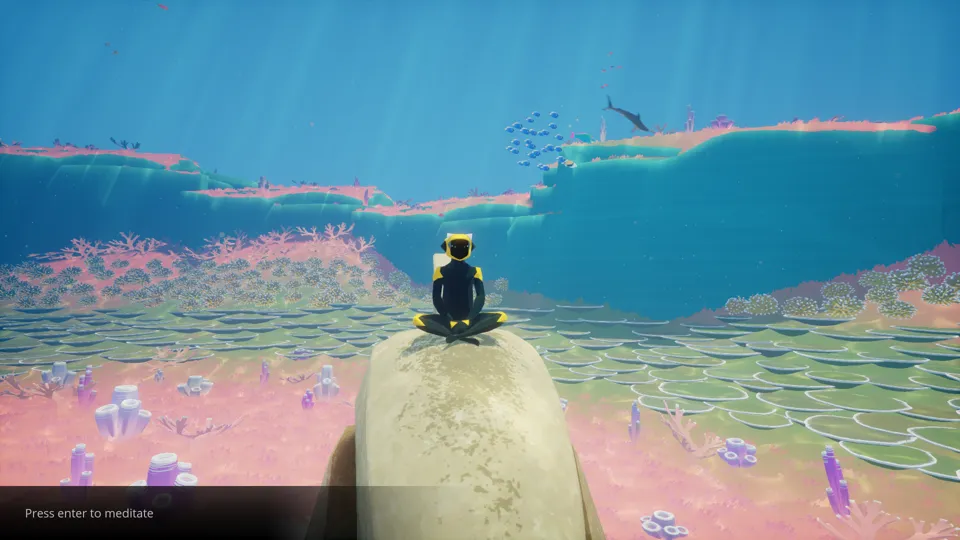 Some journeys are internal, you know.
Some journeys are internal, you know.
Of course, to say that the game is only asking the player to “take a journey” is selling it short. The sheer love in every scene is impossible to miss and shines through in the level of detail, both artistically and musically. More than anything, Abzu becomes a music video to the music, giving the player a way to explore the music in beautifully rendered environments. While I did hunt down collectibles as I went, I mostly engaged with the fish and the environment, swimming through kelp and grabbing fish so I can dance beneath the waves.
As an experience, Abzu offers enough variety in its environments and set pieces that the pace never felt like it dragged or got repetitive. While the controls are sluggish on touchpad, I fully accept that’s a me problem and not a reflection on the game itself. The music, too, switches almost imperceptibly, creating a smooth flow from one story beat to the next, conveying the player through and letting the world carry the conversation. It is game of vibes and emotion, where the experience is the point. You get out of it what you put into it, but it’s hard not to enter with a bit of wonder once the first cave opens and it becomes clear what you’re about to embark upon.
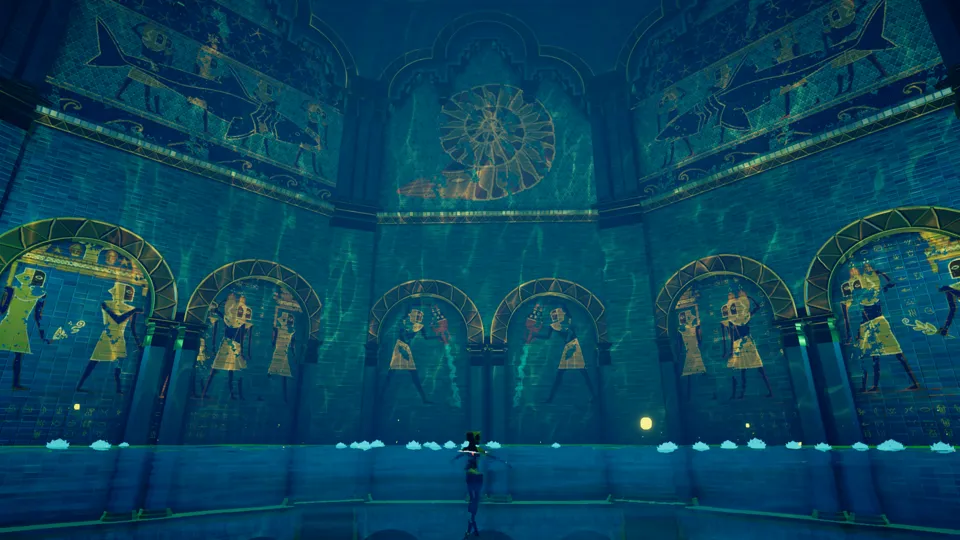 They love me and feed me and give me everything I want. I must be a god.
They love me and feed me and give me everything I want. I must be a god.
I went on my journey and was left with a thought as the credit rolled. I watched David Attenborough and Jacques Cousteau’s names go by, and I thought about what the story of Abzu actually is. Earlier, I mentioned that Abzu is a game about restoring life to the world, but that isn’t entirely accurate. Abzu is a game entirely without dialogue or text, leaving the story up to the player’s interpretation. As I moved through these caves, sparse of life until my arrival, I thought about the Sumerian mythology that is the inspiration for this game and its art style. In Sumerian mythology, Abzu and Tiamat are the twin gods of creation, representing fresh and salt water respectively. Abzu is also the great ocean undergirding all of creation. All life springs forth from Abzu. However, the dead do not return to this ocean. Instead, the souls of the dead go to dark caves in Kur, where they yearn for water and eat only dust.
It’s not a great afterlife. That’s not the point.
As I moved through the caverns, I thought about Kur and Abzu, and about bringing forth life from the sand at the bottom of the sea. Each time I brushed the sand, life sprang forth, eager to greet a place that had clearly once been its own. I was restoring life, but to a place that had already known that life, and to life that had already known that place. My little diver was recreating an endless cycle of life and death, of summoning forth from Kur to return life to Abzu. The names of great naturalists roll through the credits, not only because they were likely consulted on ocean life, but because of what they represent for our understanding of the natural world. David Attenborough, Jacques Cousteau, and those like them bring the natural world to life in a way that makes it more real, more accessible, and more meaningful. They summon the spirits of the natural world from the Kur to which we as a society have confined them, and into the Abzu of our collective consciousness.
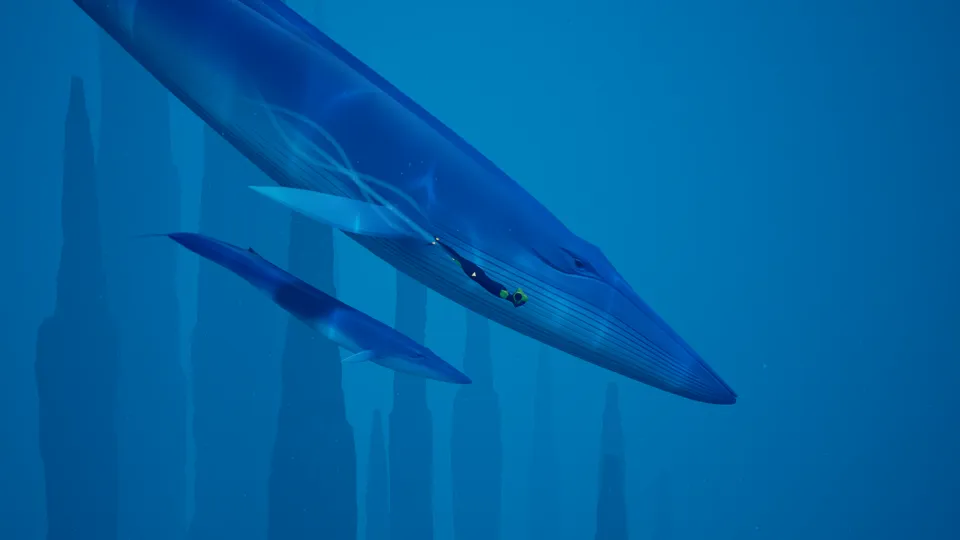 you read my philosophy now here’s a whale
you read my philosophy now here’s a whale
Ultimately, Abzu is not a game about restoring life. It is a game about celebrating life, and about bringing the beauty and majesty of life into our collective consciousness. It does this by never letting the player truly take control, instead guiding the player along a journey that lets them experience the wonder of the deep. Through its music and art, it creates a world that it then asks the player to believe in, filling it with creatures that spring to life and guide you through their lives.
It’s a work of art, relying on the magic of its subjects, and knowing they can’t possibly fail.
Approaching Abzu with the expectation that it is a game in the traditional sense is a mistake. Abzu is a philosophical treatise on the nature of life first, and a playable experience second. However, it succeeds so thoroughly at being engaging and drawing the player into the world that it’s easy to forget that you are just a passenger along for the ride. All I wanted to do was sit, watch fish, and hold on as I experienced a sparkling coral cave.
Perhaps that’s one more soul the diver drew out of Kur and into Abzu.
Developer: Giant Squid
Genre: Walking Simulator
Year: 2016
Country: United States
Language: None, Interestingly
Play Time: 1.5 - 2 Hours
Youtube: https://youtu.be/5xnUABqKYME
